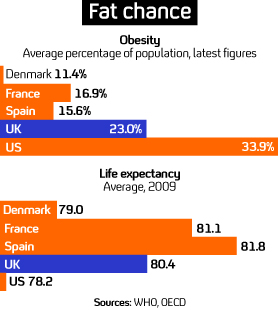Denmark introduces ‘fat tax’ on food
As Denmark becomes the first country in the world to introduce a tax on foods containing saturated fat, a public health expert tells Channel 4 News the UK should consider a similar move.

Foods which contain more than 2.3 per cent saturated fat will be affected, including butter, dairy and some Danish pastries, as well as meat and pre-cooked fast food.
Each kilogram of saturated fat will be taxed at £1.84 (16 kroner), meaning that the price of a small pack of butter will rise by the equivalent of 25p, while an average burger will cost around 9p more.
The tax was approved by parliament to help increase life expectancy in Denmark, which is currently below the OECD average at 79 years. It is expected to raise almost 2.2bn Danish kroner (around £140m) for the government.
However, in terms of obesity levels, Danes are well below the 15 per cent European average, with only 10 per cent of their population above the obesity threshold.
Obesity in the UK is getting out of hand and we need to remedy the failings of the diet of British people. Dr Mike Rayner, public health expert
In the UK, 20 per cent have been diagnosed as obese, or having a BMI of 30 or above.
In September, Hungary introduced a new tax known locally as the “hamburger law”, but that only involves higher taxes on prcoessed foods, such as soft drinks, salty snacks and food flavourings.

Will the tax change anything?
Dr Mike Rayner, public health researcher at the University of Oxford, told Channel 4 News he thought the tax was a “generally good idea”.
He added: “Modelling suggests that it will see a 14 per cent decrease in butter consumption levels in Denmark and so it will be interesting to see whether it does actually result in these kinds of changes in diet.”
However he said a tax on a food’s overall nutritional quality, rather than one element, could be more beneficial.
“There is the danger that a reduction in the consumption of saturated fat would lead to an increase in salt and added sugars, for example, and so the tax might not have actual health benefits.
“I would prefer to see a tax introduced based on a particular food’s overall nutritional quality and, that considers the amount of saturated fat, sugar and salt in food. Both France and several US states are considering putting a tax of soft drinks and this would, I think, have real health benefits.”
He said he believed improving health, rather than raising money, was the motivation of the Danish government – and said the UK should be next.
“Reducing heart disease is their concern and the money gained should be spent of promoting good health. The UK needs to consider the same stance. Obesity here is getting out of hand and we need to remedy the failings of the diet of British people,” he said.
-
Latest news
-
Scarlett Johansson ‘shocked’ and ‘angered’ claiming ChatGPT ‘imitated’ her voice3m

-
One-punch deaths: parents help son’s killer turn life around5m

-
Dirty rivers: Ruben Reuter challenges water minister8m

-
UK economy: when will the interest rate fall?3m

-
Ex-Post Office company secretary questioned over Horizon scandal5m

-




